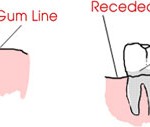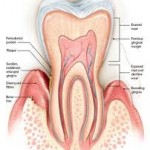Are you refraining yourself from ice cream, cold drinks, cold air in the mornings when you breathe through your mouth causing a jolt to your teeth and forcing you to stay indoors? Even biting on a candy is causingpressure to your tooth? The answer is simple, you are suffering from sensitive teeth. Wondering how did all this happen? It could be due to various reasons from decay to gum disease.

What causes teeth to be sensitive to cold?
When the pulp is irritated due to some kind of insult, such as
i.           Tooth decay – a grossly decayed tooth where the enamel layer is eaten away and reaches the dentine, the dentinal tubules gets exposed. It’s a semi-porous substructure with movement of fluid in them causing a mild and dull pain upon consuming cold drinks.
ii.           Gum recession – due to gingivitis or periodontal disease can cause receding gums and subsequent exposure of the root
surface. You could suffer from sensitivity to cold as the root surface is sensitive in nature when the protective gum tissue is lost over time.
iii.           Tooth abrasion – vigorous brushing habits results in wear of enamel layer and cause the dentin to be exposed. Change in
temperature within the tooth nerve ends up in a twinge in the tooth.
iv.           Poor oral hygiene can lead to plaque deposits around teeth and gums. As the plaque
hardens into tartar, the bacteria present are responsible for gingivitis and periodontitis that cause gum recession. The open tubules in the tooth that leaves nerves vulnerable to cold sensations.
v.           Cracked tooth – when tooth is fractured or chipped there will be an access present for bacteria from plaque which can aggravate an already irritated pulp within the tooth thus worsening the sensitivity.
vi.           A filled tooth – sometimes the dentist will opt for a non-invasive treatment in some deep carious tooth. He or she will choose
to place an amalgam filling with an underlying layer of calcium hydroxide lining the seal the exposed dentine. One may initially feel the sensitivity even after this treatment till the reparative dentine bridge is formed. It may also occur after scaling and root planing but it is temporary in nature.
vii.           Crowned tooth – a tooth with a dental crown may also be sensitive to cold. This can be due to failure in the root canal treatment done prior to the crowning or an ill-fitting crown impinging on the gums causing irritation and
subsequent receding gum line and root sensitivity.
viii.           Bruxism – a continuous grinding and clenching habit which maybe involuntary produces
extra strain and wear on the tooth surfaces. As a result, the microscopic dentinal tubules are exposed making them more sensitive as you eat or drink.
ix.           Chewing tobacco or “snuff†which is a common practice among certain groups and preferred compared to cigarette is a major cause of gum disease and tooth sensitivity.
x.           Tooth whitening products containing peroxide and baking soda are known to be major contributors of sensitive teeth especially for regular users.

How to overcome tooth sensitivity?
Avoid highly acidic food and drinks like citrus fruits, carbonated drink, wine, coffee and tea. They increase sensitivity and work against the toothpastes. They cause enamel erosion. If the sensitivity is due to decay, the treatment indicated will be depending on its severity. A mild to moderate decay can be filled while a grossly decayed tooth with poor prognosis can be extracted. Root canal treatment
or a crown can be given in cases of cracked tooth.
It is important to maintain good oral hygiene and cleanliness in all parts of teeth and mouth. A nightguard is advised as a protective
measure is sensitivity arises due to bruxism. It may help to control the habit and reduce the amount of wear on teeth thus slowing the rate of increasing sensitivity.
Visit your dentist as he or she may recommend a desensitizing toothpaste like Sensodyne which is
the most popular brand and recently launched Colgate Sensitive Pro-relief. These toothpastes are known to provide instant relief upon application to the sensitive area as they act directly on the nerve. They contain higher amount of
fluorides or potassium nitrate which occlude the dentinal tubules protecting against sensitivity.

Fluoride rinse
It is recommended to use the Colgate Sensitive along with its specially designed toothbrush made up of extra soft bristles which gently remove stains and create less wear on sensitive tooth surfaces. It is essential to use a fluoridated toothpaste always. Other forms of treatment include fluoride varnish application to desensitize the area, sealants or even fluoride mouthwashes. Fluoride rinse is
recommended for those with severe tooth decay problems. Dentist may also apply “bonding agent†to close the pores in the tooth root in order to decrease the sensitivity.
Remember to get your routine dental check-up every 6 monthsto ensure your teeth and gums are healthy.